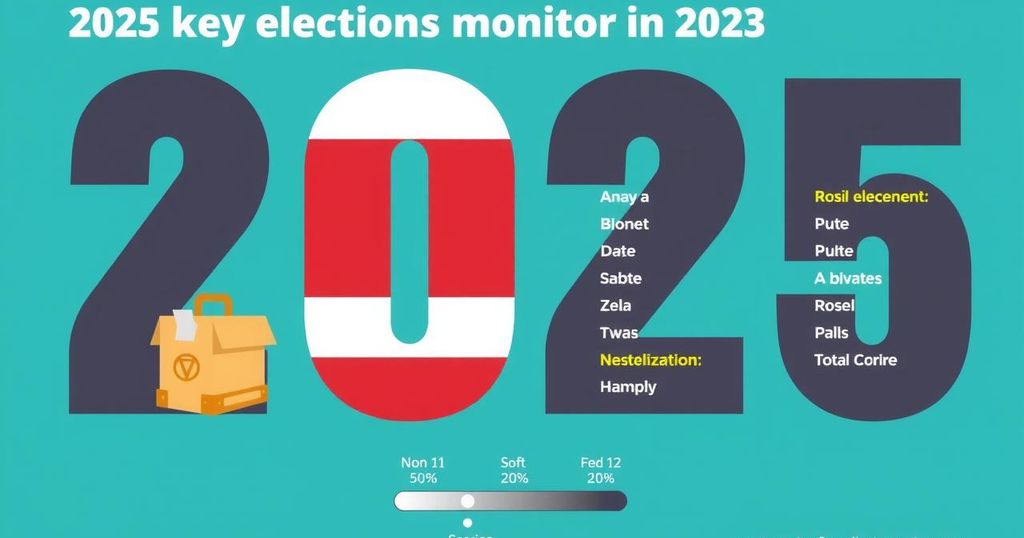Politics
ALEH HAIDUKEVICH, ASIA, BELARUS, CANADA, ELECTION, ELECTIONS, EUROPE, HANNA KANAPATSKAYA, LIBERAL DEMOCRATIC PARTY, LITHUANIA, NORTH AMERICA, OPPOSITION, PHILIPPINES, POLITICS, PRESIDENTIAL ELECTION, PRESIDENTIAL ELECTIONS, REPUBLICAN PARTY OF LABOR AND JUSTICE, SCHOOL OF INTERDISCIPLINARY GLOBAL STUDIES, SIARHEI SYRANKOU, TA, TATSIANA KULAKEVICH, UNIVERSITY OF SOUTH, UNIVERSITY OF SOUTH FLORIDA
Isaac Bennett
0 Comments
Key Elections to Monitor in 2025: Implications for Global Politics
Several crucial elections are set for 2025, including major events in Belarus, Germany, the Philippines, Canada, and Chile. Each election reflects pressing themes such as the impact of inflation, the rise of populism, and broader geopolitical tensions that could alter political landscapes significantly.
As we approach 2025, several pivotal elections are scheduled that may significantly impact global politics. Although the year may not witness the overwhelming number of elections seen in 2024, voters in Belarus, Germany, the Philippines, Canada, and Chile will all head to the polls amid notable challenges such as inflation, political extremism, and geopolitical tensions.
In Belarus, Alexander Lukashenko is set to secure his seventh term on January 26, 2025, with no serious opposition participating. The election atmosphere remains oppressive, with ongoing suppression of dissent and political freedom.
Germany will hold a federal election on February 23, 2025, following a collapse of the coalition government led by Chancellor Olaf Scholz. Economic pressures, including recession and international competition, necessitate a potential shift in leadership, with projections favoring Friedrich Merz of the Christian Democratic Union.
The Philippines will conduct midterm elections on May 12, 2025. These elections are crucial for President Ferdinand Marcos Jr. to maintain political dominance and to navigate his relationship with Vice President Sara Duterte. A strong showing in the Senate elections could safeguard Marcos’s position amid emerging political rivalries.
Canada is also on the brink of an election before the October 20, 2025 deadline due to Prime Minister Justin Trudeau’s dwindling support and governmental instability. With rising conservative sentiments, Trudeau’s future is uncertain, as tensions mount surrounding economic policies and international relations.
Finally, Chile’s presidential election on November 16, 2025, is noteworthy as Gabriel Boric steps down, leaving a residue of political fragmentation from previous constitutional crises. Polls indicate an advantage for the opposition, potentially reshaping Chilean governance amidst socioeconomic concerns.
In the current political climate, significant global dynamics are influencing upcoming elections in various nations. Themes such as inflation, political instability, and geopolitical conflicts are paramount, reflecting broader challenges faced by democracies around the world. In particular, countries like Belarus and Germany are grappling with autocratic resilience, coalition government failures, and the influence of external pressures. The electoral periods in the Philippines and Canada will also test the prevailing political landscapes, while Chile seeks direction post-lived experiences of social unrest and constitutional debates.
The upcoming elections in 2025 provide a critical junction for various nations, each facing its unique conundrums rooted in economic, social, and political challenges. Belarus is poised for continued authoritarianism; Germany may shift towards a right-leaning leadership; the Philippines appears set to navigate significant internal power dynamics; Canada must confront increasing political pressures; and Chile’s political future hangs in a delicate balance following past upheavals. These elections will undoubtedly shape the political narrative in their respective countries for years to come.
Original Source: theconversation.com




Post Comment